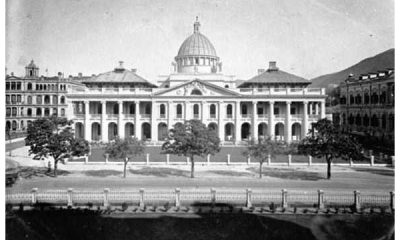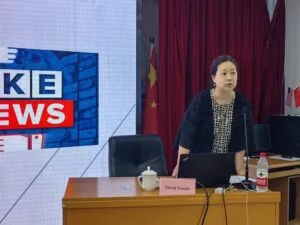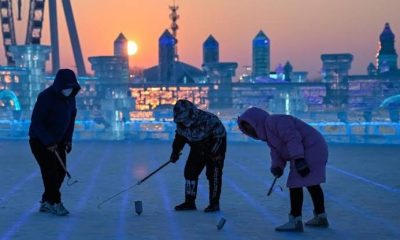Foreign
China launches military exercises around Taiwan after Tsai’s U.S. visit
China’s military said on Saturday it launched three days of military exercises around Taiwan, after the leader of the self-ruled island infuriated Beijing by visiting the United States.
The exercises are being held “according to plan” to the north, south and east of Taiwan, a statement by the People’s Liberation Army (PLA) said, providing no further details.
Taiwan said the military would “defend our country” and that assets had been redeployed.
Taiwan’s President Tsai Ing-wen met Speaker of the U.S. House of Representatives Kevin McCarthy for talks in California on Wednesday.
The meeting between Tsai and the senior Republican lawmaker was the first of its kind on U.S. soil.
She returned to Taiwan on Friday night.
Beijing denounced the visit and promised to retaliate.
On Friday, the Chinese government announced sanctions against U.S. organisations which hosted the Taiwanese leader during her trip.
Tsai stopped in the U.S. on her return from Central America, where she met the leaders of Guatemala and Belize.
The White House insists her time in the U.S. was not an official visit.
Beijing regards Taiwan as part of China and rejects any official contact between other countries and Taipei.
China has previously raised the prospect of taking the island by force if necessary, with the U.S. threatening to take action if that happens. Taiwan is a self-governing democracy and has long seen itself as independent.
A visit to Taiwan in August by McCarthy’s predecessor, the veteran Democrat Nancy Pelosi, prompted China to stage its biggest live-fire drills in the waters around Taiwan in years.
Following Beijing’s announcement of the new drills, Taiwan’s Ministry of National Defence said the country’s armed forces “monitored the situation and responded accordingly with our assets to defend our country.”
In an update from 11 am (GMT 0400), the ministry said that 42 PLA warplanes and eight vessels were detected around Taiwan in the last five hours.
“29 of the detected aircraft had crossed northern, central, and southern median line of the Taiwan Strait and entered our southwest ADIZ (air defence identification zone), attempting coercion on us,” the ministry said on Twitter.
Taiwan views the median line as a political boundary marking its area of control and China has generally respected it in the past.
Taiwan’s Mainland Affairs Council, which handles dealings with Beijing, on Saturday condemned China’s attempts at military intimidation, saying such moves undermine regional peace and stability.
“Taiwan will not submit and will not act in haste to provoke,” it said in a statement.
During a lunch banquet with a visiting U.S. congressional delegation in Tapei on Saturday, Taiwan’s President Tsai stressed that cooperation among democracies has become even more important because “in recent years, we have faced continued authoritarian expansionism.”
“We will continue to work with the United States and other like-minded countries to jointly defend the values of freedom and democracy,” Tsai said.
U.S. House Foreign Affairs Committee Chairman Michael McCaul, who led the delegation, said that it was important that all democracies stand together against tyranny and oppression, citing Russia’s invasion of Ukraine as well as Chinese aggression against Taiwan and in the Pacific.
“We are doing everything we can in Congress to speed up these sales and get the weapons that you need to defend yourself,” McCaul told Tsai.
“And we will provide training to your military, not for war, but for peace,” he added.
The cross-party U.S. delegation’s three-day visit to Taiwan, scheduled to end on Saturday, is part of a longer trip to the Indo-Pacific region.
Before meeting with Tsai, the group had met with other national leaders in Japan and South Korea, McCaul said.
Later on Saturday, Taiwan’s Ministry of National Defence released a video showing that it was closely monitoring the situation, adding that Taipei seeks neither escalation nor conflict.
“We remain steadfast, rational, and serious to react and defend our territory and sovereignty,” the ministry said in the clip, which included footage of Taiwanese military exercises.

Foreign
3 teens arrested in Germany for allegedly plotting terror attack
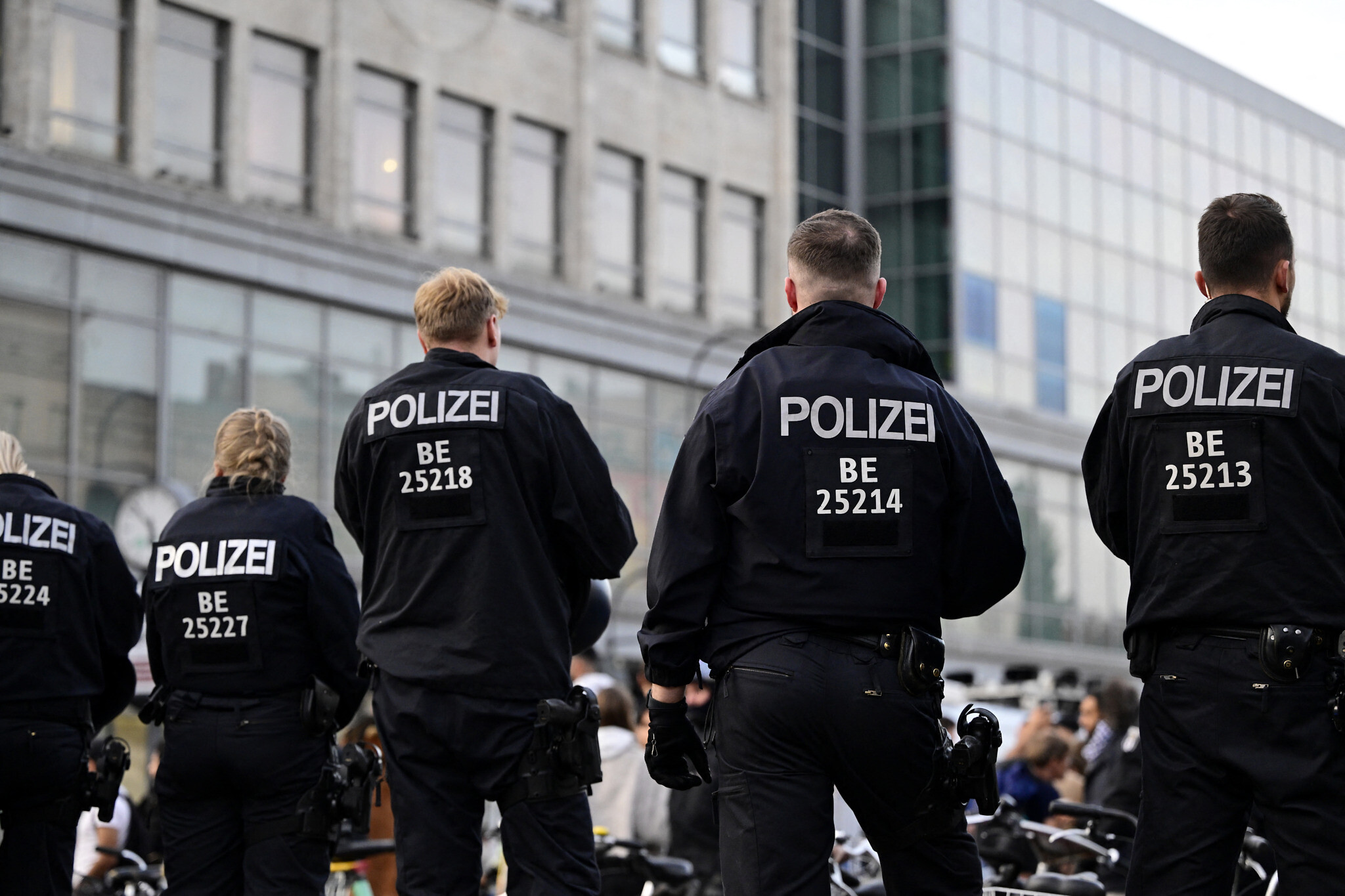
German authorities have arrested three teenagers aged 15 and 16 on suspicion of plotting a deadly Islamist terrorist attack in the western German state of North Rhine-Westphalia, prosecutors said on Friday.
The state’s Central Office for the Prosecution of Terrorism (ZenTer NRW) sought an arrest warrant for the teenagers over the Easter holiday.
They were suspected of plotting a terrorist attack in accordance with the aims and ideology of (extremist militia organisation) Islamic State.
The detained suspects are a 15-year-old girl from Dusseldorf, a 16-year-old girl from the Märkischer Kreis district and a 15-year-old boy from the Soest district, located about 100 kilometres to the east of Dusseldorf.
A fourth suspect has reportedly been identified in the south-western German state of Baden-Württemberg, and the local court there has issued an arrest warrant.
According to the investigators, the teenagers are accused of having agreed to commit murder and manslaughter.
This is in conjunction with the preparation of a serious act of violence endangering the state.
The presumption of innocence applied in all stages of the proceedings.
Security sources told newsmen that the young people had formed a chat group, but had not drawn up a concrete attack plan for a particular time and place.
However, sources said the cities of Dortmund, Dusseldorf and Cologne were discussed as targets, and attacks with knives and Molotov cocktails on people in churches or police officers in police stations had been considered.
The sources said authorities had also conducted searches as part of the investigation.
A machete and a dagger were seized in Dusseldorf, but no evidence of the construction of incendiary devices was discovered.
Sources said the father of the Dusseldorf suspect had already attracted attention from authorities in the past because he had allegedly collected donations for the Islamic State.
The investigators declined to reveal how the suspected terrorists were tracked down, but said that foreign intelligence agencies “did not play a role.”
Foreign
Putin Registers As Candidate For Russia’s Next Presidential Election
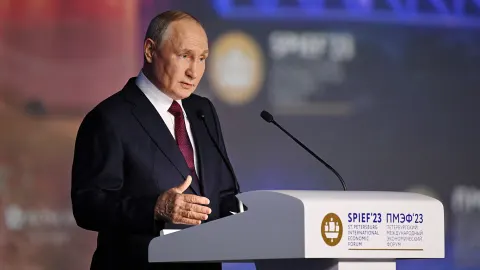
Russia on Monday officially recognised Vladimir Putin as a candidate for the presidential elections in March, a vote that he is all but certain to win.
The 71-year-old has led Russia since the turn of the century, winning four presidential ballots and briefly serving as prime minister in a system where opposition has become virtually non-existent.
The Central Election Commission said it had registered Putin, who nominated himself, as well as right-wing firebrand and Putin-loyalist Leonid Slutsky as candidates for the vote.
The election will be held over a three-day period from March 15 to 17, a move that Kremlin critics have argued makes guaranteeing transparency more difficult.
Following a controversial constitutional reform in 2020, Putin could stay in power until at least 2036.
Rights groups say that previous elections have been marred by irregularities and that independent observers are likely to be barred from monitoring the vote.
While Putin is not expected to face any real competition, liberal challenger Boris Nadezhdin has passed the threshold of signatures to be registered as a candidate.
However, it is still unclear if he will be allowed to run, and the Kremlin has said it does not consider him to be a serious rival.
-
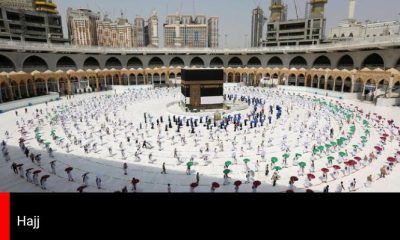
 Headline5 days ago
Headline5 days agoHajj: Five States With N383bn Debt Budget N9bn For Pilgrims
-

 Headline13 hours ago
Headline13 hours agoLassa Fever Kills 150 In Nigeria — NCDC
-
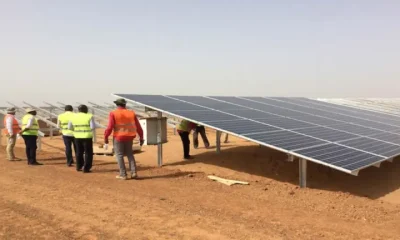
 News13 hours ago
News13 hours agoFG To Provide Solar Subsidy In Nigeria Through $750 Million World Bank Loan
-
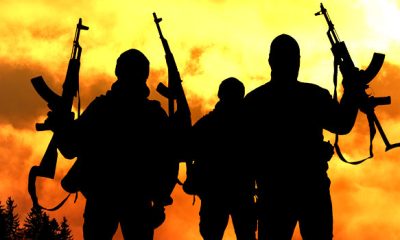
 Headline13 hours ago
Headline13 hours agoUnknown Gunmen Abduct Channelstv Reporter In Port-harcourt
-
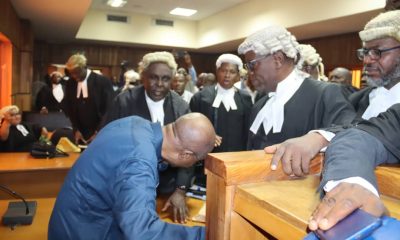
 News13 hours ago
News13 hours agoLagos Court Grants Emefiele N50m Bail
-
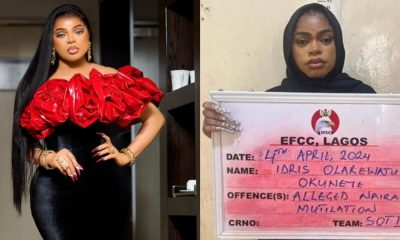
 News13 hours ago
News13 hours agoBreaking…Naira abuse: Court sentences Bobrisky to 6 months in custody
-
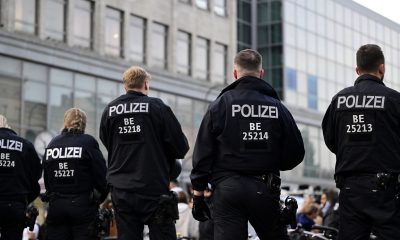
 Foreign12 hours ago
Foreign12 hours ago3 teens arrested in Germany for allegedly plotting terror attack
